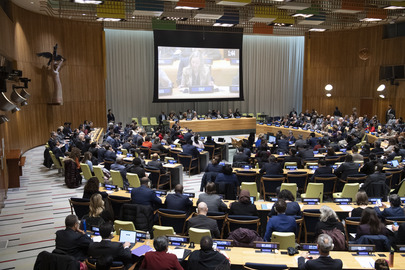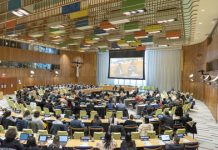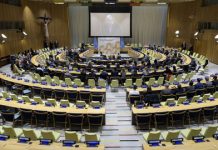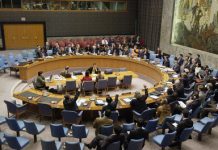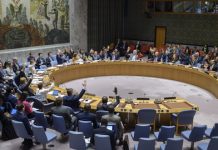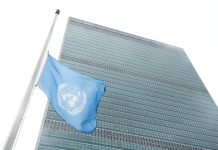UN chief hails Pope Francis as ‘a transcendent voice for peace’
UN Secretary-General António Guterres has joined the world in mourning the death of His Holiness Pope Francis, on Monday at his residence in Vatican City. He was 88.
The former Jorge Mario Bergoglio from Argentina was elected to the papacy in March 2013. He was the first priest from the Americas region to lead the Catholic Church worldwide and a strong voice for social justice.
Mr. Guterres, speaking at UN Headquarters in New York, described the pontiff as a messenger of hope, humility and humanity.
CUT “He was a transcendent voice for peace, human dignity and social justice. He leaves behind a legacy of faith, service and compassion for all — especially those on the margins of life or trapped by the horrors of conflict.”
He described the pontiff who had addressed crowds in the Vatican just the day before to mark Easter, following a long battle against pneumonia, as “a man of faith for all faiths – working with people of all beliefs and backgrounds to light a path forward.”
The Secretary-General said the UN was greatly inspired by the Pope’s commitment to the goals and ideals of the world body, a message that he conveyed in their various meetings.
He noted that Pope Francis had once said “the future of humankind isn’t exclusively in the hands of politicians,” great leaders, or big companies – but was most of all, in the hands of those people who recognize the other as a ‘you’.
Mr. Guterres said the currently divided and discordant world “will be a much better place if we follow his example of unity and mutual understanding.”
UN envoy warns of ‘point of no return’ as gang violence engulfs Haiti
The security crisis in Haiti has reached a “point of no return,” the UN’s top envoy to the country warned on Monday, urging the international community to bolster support for its overstretched security forces amid a surge in gang violence and fears of total State collapse.
UN Special Representative María Isabel Salvador told ambassadors in the Security Council that a “deliberate and coordinated” campaign is being waged by organized criminal groups to expand territorial control and paralyse the capital.
“The magnitude of the violence has sown panic” among the Haitian population, she said.
More than 1,000 people were killed and nearly 400 injured in February and March and a further 60,000 newly displaced, adding to the one million Haitians already forced from their homes as of last December.
The Special Representative called on all Member States to increase support to Haiti’s security forces, particularly the Multinational Security Support (MSS) Mission – “not as a matter of choice but of necessity.”
Authorised by the Security Council in October 2023, the mission is an international security initiative to assist the Haitian National Police to end the gang violence.
She said that without timely, decisive and concrete international assistance, the security situation in Haiti was destined to deteriorate, and any delay in Security Council support would only fuel the chaos:
“I urge you to remain engaged and answer the pressing needs of the country and its people. For its part, notwithstanding the enormous security challenges that we face, BINUH, as mandated by this Council, will spare no effort in supporting the Haitian-led political process towards the restoration of peace and democratic institutions, as soon as conditions are met.”
Asian crime syndicates expand gobally, new UN report warns
Transnational crime groups from East and Southeast Asia are spreading beyond the region – largely due to increased enforcement measures, according to a new UN report published on Monday.
Benedikt Hofmann from the UN Office on Drugs and Crime (UNODC) notes that these groups are expanding alongside the reach of their illegal operations. They are also hedging against future risks in Southeast Asia.
The report, titled Inflection Point, highlights the shift of scam centres from special economic zones in Cambodia, Laos, Myanmar, and the Philippines. Local crackdowns are pushing these operations into new areas.
John Wojcik, a UNODC analyst, compares the spread to a kind of cancer. While authorities disrupt operations in one area, they reappear elsewhere – creating an interconnected ecosystem of crime.
Weak governance in some areas attracts new players and fuels corruption. This allows the illicit industry to grow, with scam centres generating up to $40 billion each year.
These criminal groups launder money through cryptocurrencies and underground banking, while the proceeds infiltrate global banking systems, making them leaders in cyber-enabled crime, UNODC says.
Matt Wells, UN News.
Music composed and produced by Joachim Harris. All rights reserved
Source of original article: United Nations (news.un.org). Photo credit: UN. The content of this article does not necessarily reflect the views or opinion of Global Diaspora News (www.globaldiasporanews.com).
To submit your press release: (https://www.globaldiasporanews.com/pr).
To advertise on Global Diaspora News: (www.globaldiasporanews.com/ads).
Sign up to Global Diaspora News newsletter (https://www.globaldiasporanews.com/newsletter/) to start receiving updates and opportunities directly in your email inbox for free.


